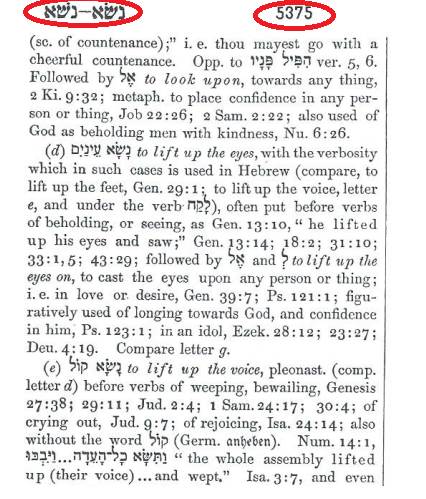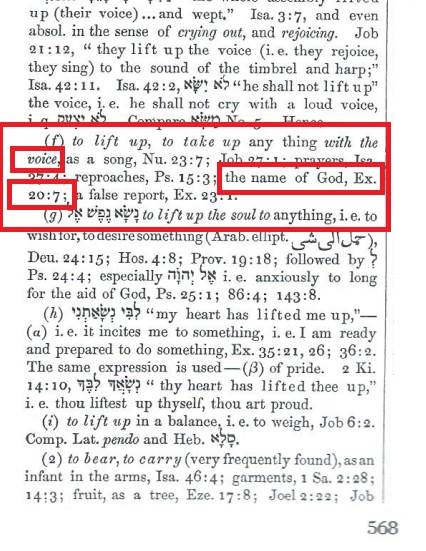On the Interpretation of the Third Commandment and the Attitude Toward GOD's Name in the New Testament Era
1. The Original Meaning of "Taking in Vain":
♦ Hebrew Lexical Meaning:
♦ "Vain" (Strong's 7723, שָׁוְא shav): Includes meanings such as "falsehood, invalidity, vanity, or unreality." This directly relates to the misuse of GOD's name, implying that any false, erroneous, or irreverent usage of GOD's name constitutes a violation of the commandment.
♦ "Take" (Strong's 5375, נָשָׂא nasa): Refers to "lifting up, uttering, or pronouncing," particularly in public or solemn contexts.
♦ Combined Meaning:
According to Gesenius' Hebrew-Chaldee Lexicon, taking GOD's name in vain involves "erroneously mentioning or using it," "uttering it carelessly or without significance," and "swearing falsely by it." This underscores the importance of pronouncing and respecting GOD's name correctly and using it appropriately.
2. A Higher Standard in the New Testament Era:
JESUS [YESU] clearly states in Matthew 22:37: "You shall love the LORD your GOD with all your heart, with all your soul, and with all your mind." This indicates that the expectation is not only to avoid misuse of GOD's name in behavior and speech but also to revere and honor His name from the depths of one's heart.
3. Does Using an Incorrect Name Violate the Third Commandment?
The deviation in names such as "Jehovah" and the modern English pronunciation of "JESUS" from the original sounds raises an important issue:
♦ Jehovah: This term was created in the 16th century by blending the Hebrew Tetragrammaton (יהוה, YHWH) with vowel marks, resulting in an inaccurate pronunciation. Historical and linguistic evidence shows that this is not the true pronunciation of GOD's name.
♦ JESUS (Modern English Pronunciation): Early Greek (Ἰησοῦς, Iēsous) and Latin (IESU) retained pronunciations closer to the original. The modern English rendering "JESUS" evolved due to linguistic and historical changes. However, its divergence from the original pronunciation raises concerns, especially regarding reverence for GOD's name.
4. Is This Related to the Third Commandment?
Whether using a name far removed from the original pronunciation violates the Third Commandment depends on the following:
♦ Intention and Awareness: If the usage stems from ignorance or cultural background, it may not necessarily constitute "taking in vain." However, knowingly persisting in using an erroneous name could violate the commandment.
♦ Core Spirit of the Third Commandment: The commandment emphasizes not only correct pronunciation but also the proper attitude and reverence. If a mispronunciation is accompanied by irreverence or misunderstanding, it is more likely to violate the commandment.
5. Summary and Practice:
♦ Purification of Language: Referencing (Zephaniah 3:9), since we are asked to call on the name of the LORD with a "pure language," we should strive to understand and use names closer to the original, such as "YESU" or "IESU."
♦ Returning to Original Faith: Avoid being influenced by cultural or historical errors and re-examine how we address GOD to ensure alignment with biblical revelation.
♦ Upholding the Third Commandment: Avoid all forms of vanity, falsehood, and erroneous usage, elevating GOD's name to the highest honor.
This analysis encourages deeper reflection on biblical truths and reminds Christians to adhere strictly to biblical teachings in speech and actions.
|
 |


"...to this day Orthodox Jews will say "Adoshem" ("name of Ado-," leaving Adonai incompleted) or "Elokim" and write G-d and L-rd instead of the full words. This practice, though it is not followed by other Jews or by Christians, highlights the fact that the commandment does more than forbit profanity and sacrilegious oath-taking; it covers as well irresponsible, loose exclamations as "dear God," "good Lord," "by God," and the like. Whether the commandment forbits false swearing by GOD's name, or prohibits all wrong or vain usage, the basic intent remains: to safeguard His name from erosion and to maintain the sense of His holiness among His children." (The Torah - A Modern Commentary, edited by W. Gunther Plaut, Union of American Hebrew Congregations, New York, 1981, p.543)
"For this is the love of GOD, that we keep His commandments; and His commandments are not heavy." (1 John 5:3)
"He said to Him, Which? And IESU said, You shall not commit murder; you shall not commit adultery; you shall not steal; you shall not bear false witness; honor your father and your mother; and you shall love your neighbor as yourself." (Matthew 19:18,19)
Why did IESU make no mention of the first four commandments? Are they not important? Absolutely not!
"And IESU said to him, You shall love (the) LORD your GOD with all your heart, and with all your soul, and with all your mind. This is (the) first and great commandment." (Matthew 22:37,38)
"For truly I say to you, Until the sky and the earth pass away, in no way shall one iota or one tittle pass away from the Law until all come to pass." (Matthew 5:18)
"Behold, I, Paul, say to you that if you are circumcised, Christ will profit you nothing." "For in Christ IESU neither circumcision nor uncircumcision has any strength, but faith working through love." (Galatians 5:2,6)
"Circumcision is nothing, and uncircumcision is nothing; but the keeping of GOD's commandments." (1 Corinthians 7:19)
"Then do we make the Law of no effect through faith? Let it not be! But we establish Law." (Romans 3:31)
"For Moses has been preached in every city from the earliest times and is read in the synagogues on every Sabbath." (Acts 15:21)
"This calls for the patient endurance on the part of the saints who obey GOD's commandments and remain faithful to IESU." (Revelation 14:12)
"Not everyone who says to me, 'LORD, LORD,' will enter the kingdom of heaven, but only he who does the will of my Father who is in heaven." (Matthew 7:21)
"For I tell you that unless your righteousness surpasses that of the Pharisees and the teachers of the law, you will certainly not enter the kingdom of heaven." (Matthew 5:20)
Top of Page
|
|
|
|
|



